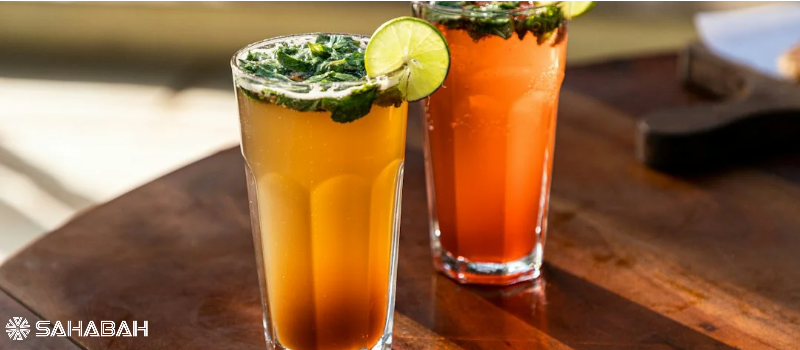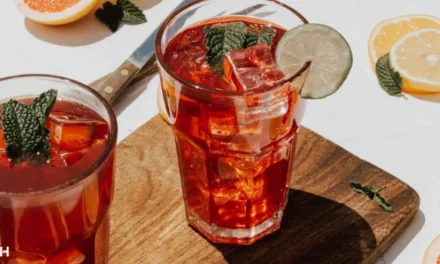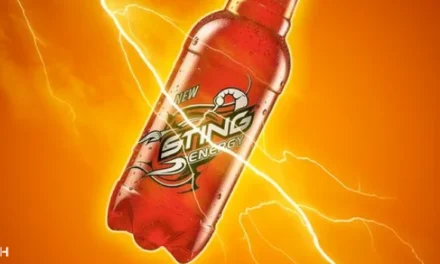Mocktails, or non-alcoholic cocktails, have grown increasingly popular for Muslims and others abstaining from alcohol whether for religious, health or personal reasons. But can halal-observant Muslims partake in mocktails while adhering to Islamic dietary restrictions? We dive deep into what ingredients and processes may impact whether these refreshing non-alcoholic concoctions are considered halal.
Defining Halal Food Standards
Halal guidelines establish what foods and drinks are permissible for Muslims to consume under Islamic law. Key criteria include:
- Cannot contain alcohol or other intoxicants that impair judgment
- No pork or improperly slaughtered meat
- Gray areas around certain desserts, sodas or sweeteners
Haram foods like alcohol are believed to have a corrupting influence according to teachings in the Quran. They can inhibit self-control or impact moral decision making when consumed.
The Arabic word “halal” means permissible or lawful. Halal certification organizations in Muslim countries and regions of the world audit products, dining establishments and beverage providers to verify adherence to Islamic dietary guidelines. Receiving this official halal designation for mocktails would assure Muslims they meet religious standards around alcohol avoidance.
Typical Mocktail Ingredients and Halal Considerations
Common mocktail components generally qualify as halal, but a few ingredients require closer evaluation:
Fruit Juices
Most fruit juices are considered halal, especially when freshly squeezed. They inherently do not contain alcohol unless something has intentionally been added during preparation. Opting for 100% pure fruit juices avoids the fermented products.
Sweeteners
Some sweeteners like agave nectar or simple syrups are certainly halal. However, some dessert glazes or vanilla extracts may use alcohol as part of the production process. While much of the ethanol evaporates when baking, some residual amounts may remain. Each Muslim must decide whether these trace elements are acceptable for their needs.
Sodas and Sparkling Waters
Fizzy sodas like coca cola, lemon-lime soda, ginger ale or sparkling waters are halal approved in moderation, according to mainstream scholars. Ingredients like caramel coloring may merit checking but these drinks provide refreshing bubbly bases for mocktails. Just avoid champagne or wines used for the sparkle effect instead of grape juice or fruit sodas.
Garnishes
Halal-permissible mocktails tend to garnish drinks with mint leaves, sliced fruit like citrus wedges, berries, pineapple fronds or umbrellas highlighting the tropical flair. Anything that comes directly from halal fruits and plants or without infusion of alcohol makes for a tasty adornment.
Ice and Water
Ice, water and club soda are also inherently halal, unless contaminated by haram products during processing. But using dedicated containers and preparation equipment minimizes any risks.
In reviewing various components, the fruits, herbs, sodas and ice stand out as normally compliant with halal guidelines. But examining how they are handled and processed merits a closer look too.
Do Mocktails Containing Vanilla Extract Qualify as Halal?
One gray area around mocktail halal status centers on vanilla extract. The significantly lower cost of production by using alcohol allows more abundant usage in baked goods, syrups and widespread flavoring compared to pricier alternatives like vanilla beans or paste.
During the extraction process, vanilla bean pods get chopped, treated to draw out the flavor and then soaked in a solution of at least 35% alcohol. After percolating for up to several months, the resulting flavorful liquid gets filtered and bottled as vanilla extract sold in stores.
So mocktail recipes calling for vanilla extract do end up adding a small amount residual alcohol contained within. But since most evaporates when heated or blended into the drink mixture, only minuscule amounts would be present when served.
This leads to differences in opinion among Muslim scholars whether trace alcohol elements make drinks prohibited or not. Some interpret that vanilla extract may be tolerable since any residual alcohol is unlikely to cause intoxication. But other faith leaders prohibit it, adhering to stricter standards that no alcohol means none at all.
For mocktails, potential alternatives include:
- Using pure vanilla essence or flavoring
- Infusing drinks with a fresh vanilla bean pod
- Opting for alcohol-free vanilla syrups
These provide the desired sweet vanilla notes without the same doubts the extract might pose over permissible standards. Every Muslim must decide for themselves on this aspect based on their personal standards and religious guidance they follow.
Mocktail Preparation Methods Relevant to Halal Status
Besides suspect ingredients, the preparation process for mocktails also matters for avoiding contamination with alcohol.
Shared equipment getting used for both mocktails and cocktails risks exposing non-alcoholic drinks by improper cleaning or pouring techniques. For example:
- Improper sequence of making drinks
- Pour spouts not fully drained then dripped into mocktail mixture
- Cocktail shaker not thoroughly rinsed of leftover alcoholic residues
Likewise, the practice of soaking orange peels, lemon rinds or other citrus fruits in vodka or other liquors then adding to mocktails aims to infuse colorful, tangy oils into the non-alcoholic mixtures. But the infusion process essentially contradicts keeping drinks completely alcohol-free.
To keep mocktails unquestionably halal-permissible, utilizing dedicated drink-making equipment is advisable. As is avoiding liquor-infused garnishes by substituting comparable citrus flavors through drops of fresh lemon juice or citric fruit extracts instead.
Non-Alcoholic Substitutions to Ensure Mocktails Are Halal
Muslims seeking refreshing mocktails compliant with halal standards can take the following precautions:
Alcohol-Free Vanilla
- Use pure vanilla extract or beans
- Opt for vanilla syrup without alcohol
Dedicated Mocktail Equipment
- Keep drink mixers, shakers, pour spouts separate
- Thoroughly wash equipment if shared
Skip Liquor-Infused Fruits
- Garnish with slices of fresh citrus instead
- Add citric acid or extracts for flavor
Select Unfermented Juices
- Check sodas and juices are fully non-alcoholic
- Avoid anything potentially fermented
Taking these modest steps around ingredients and process gives Muslims confidence to enjoy halal-approved mocktails according to their religious convictions.
Thirst-Quenching and Permissible Mocktail Recipes for Muslims
Here are 5 refreshing mocktail recipes that avoid alcohol and adhere to halal standards for Muslims seeking cool non-alcoholic beverages:
Tropical Pineapple Mocktail
- 1 cup pineapple juice
- 2 Tbsp lime juice
- 1/2 cup ginger ale
- Pineapple wedge & mint leaf garnish
Combine all liquids over ice. Garnish glass with pineapple wedge & mint.
Sparkling Raspberry Spritz
- 1 cup raspberry juice
- 2 Tbsp lemon juice
- 1/2 cup soda water
- Fresh raspberries for garnish
Blend juice, soda water and raspberries in a mixer. Pour over ice and enjoy this fizzy berry refresher!
Zesty Lime Cooler
- 1/2 cup lime juice
- 12 oz ginger beer or ale
- 12 oz lemonade
- Sliced lime wheel garnish
Squeeze lime juice then top glass with lemonade & ginger beer over ice. Garnish glass rim with a lime wheel.
Mojito Mocktail
- 1/2 cup lime juice
- 16 oz soda water
- 2 Tbsp agave nectar
- Mint leaves
Muddle mint leaves with lime juice and agave. Add soda water and ice. Top with sprig of mint.
Cucumber Gin-Free Tonic
- 1 cucumber, peeled and chopped
- 1 juiced lime
- 12 oz tonic water
- Cucumber ribbon garnish
Muddle cucumber in a shaker. Pour in lime juice and tonic over ice. Garnish with cucumber ribbon.
These halal mocktails avoid alcohol while capturing refreshing flavors through juices, syrups and creative combinations suitable for Muslims. The possibilities are endless for crafting fun non-alcoholic beverages all can enjoy.
For large gatherings, create fun mocktail bars allowing guests to customize their own drinks by selecting a base juice or soda then mixing in creative combinations of citrus, herbs and garnishes. Set out halal ingredients that appeal to people of all faiths to quench thirsts in a lighthearted mocktail manner.
Adhering to Dietary Needs While Bonding Over Beverages
In multi-faith communities, being aware and considerate of different religious needs around food and drink facilitates positive connections. For Muslims abstaining from alcohol, providing delicious non-alcoholic options demonstrates warm inclusiveness, not exclusion from festive bonding.
Mocktails coated in condensation, fruit and feisty flavors deliver the deliciousness without compromising faith standards. They open doors for Muslims to join in raising glasses together during special occasions, even if glasses contain ginger ale rather than champagne! Communicating about halal ingredients and preparation methods also spreads cultural appreciation.
Mocktail Variations Across Muslim Cultures
People of Muslim faith span many cultural backgrounds around the world. And unique mocktail variations by region reflect those localized twists.
In the Middle East, popular halal mocktails incorporate ingredients like camel milk, saffron, date syrup or apricot nectar mixed into citrusy foundations. Vibrant spices, desserty notes and rich textures craft an exotic mocktail experience.
Asian Muslim cultures might combine coconut milk, almond jelly, mango or lychee fruits balances by tart lime or lemongrass. Tropical flavors stirred together with creamy coconut milk creates refreshing mocktails suited for a beachside lounge.
Vibrant herbs like purple basil, citrusy calamansi lime and ginger are popular across halal mocktails recipes in Southeast Asia regions as well. Creative combinations mixed with non-alcoholic beers make for fizzy non-intoxicating happy hour beverages too.
Part of the delight in mocktail culture comes from experimenting across flavors, textures and presentation styles tailored to localized tastes. Creating ornate garnishes, bespoke syrups and customized serving methods adds to the sensory experience.
Wellness Benefits Appeal to Conscientious Consumers
Beyond accommodating religious practices, mocktails also align with consumer health movements towards less alcohol. The rise in non-alcoholic beverages across general populations relates to improved awareness around long term impacts.
While an occasional glass of wine or cocktail may be fine, increased risk for liver disease, cancers and addiction comes with over-consuming alcohol. People wish to socialize at venues serving alcohol while better regulating their intake.
Additionally, expanding product choices empowers people who simply do not wish to drink or have struggled with alcohol dependence. Whether for faith principles, wellness goals or personal reasons, mocktails deliver an appealing alternative.
Final Considerations on Mocktails Meeting Halal Standards
In summary, mocktails provide a refreshing beverage that typically adheres to Islamic dietary guidelines with a few modest tweaks:
Check labeling for alcohol-free verification
Bottles or cans should clearly state “non-alcoholic” or “alcohol-free”
Opt for alcohol-free vanilla extract or beans
Alternatives remove any doubts over vanilla’s permissibility
Use dedicated mocktail equipment
Keep separate from cocktail drink mixers and shakers
Substitute macerated fruit garnishes
Instead, drop fresh citrus juice or non-alcoholic extracts
Taking these simple precautions around ingredients and process gives Muslims, and anyone avoiding alcohol, confidence to enjoy halal-approved mocktails suited to their religious and wellness needs.
The culture around mocktails and specialty non-alcoholic beverages continues growing across global populations and demographics. What began as feel-good happy hour replacements has expanded into a booming industry with indexed growth outpacing many alcoholic categories.
Mocktails now draw an aware clientele looking to imbibe alluring flavors absent the effects of alcohol. And halal-conscious products in particular give Muslims assurance their chosen beverage complies with Quran teachings and blessings.
The mocktail movement ushers in inclusivity for modern societies where people of diverse faiths and lifestyles intermingle. Crafting spectacular non-alcoholic drinks proves everyone can partake in the merriment and toast fellow guests without compromising religious beliefs or wellness goals.
For Muslims seeking to adhere to moderation principles central to Islam, mocktails brew together the best of both worlds. Social gatherings envelop all guests in the fanfare while sampled drinks keep sobriety and sanctity intact. Just as flavors meld together during mingling at events, so too can people bond while respecting differences in permitted libations.
The refreshing mocktail possibilities prove faith and fun can flow in the same glass. Halal-approved mocktails like the tropical pineapple, berry and mojito recipes highlighted here demonstrate the bounty of options fitting for Muslims. Adapting preparations also opens the door for anyone abstaining from alcohol, for health or personal reasons, to feel welcome sipping these flavorful beverages.
In the spirit of multicultural understanding, mocktails provide the perfect ice-breaking opportunity. Interfaith events can literally mix together delicious crosses between Middle Eastern camel milk mocktails with Asian fruit flavors for example. Serving such halal delights alongside traditional cocktails shows how gatherings can celebrate range of palates. Just remember to label ingredients clearly and use separate preparation equipment to avoid cross contamination!
Frequently Asked Questions: Are Mocktails Halal?
Yes, mocktails are considered halal as they are non-alcoholic beverages and do not contain any alcohol.
Can Muslims drink mocktails?
Yes, Muslims can drink mocktails as they are non-alcoholic and do not contain any haram (forbidden) substances.
What are some common ingredients in mocktails?
Common ingredients in mocktails include orange juice, halal wine, almond milk, grapefruit juice, apple juice, and various non-alcoholic mixers.
Do mocktails contain any alcohol?
No, mocktails are completely alcohol-free, with 0.0% alcohol content, making them permissible for Muslims to consume.
Is it considered haram to consume mocktails?
No, consuming mocktails is not considered haram as they do not intoxicate and are free from any haram substances.
Can mocktails be served at Islamic events and gatherings?
Yes, mocktails are considered halal and can be served at Islamic events and gatherings, offering a refreshing drink option for all guests.
Are soft drinks like Coke and Fanta considered halal?
Yes, soft drinks like Coca cola and Fanta are considered halal as they do not contain any alcohol or haram ingredients.
What makes mocktails the perfect choice for any occasion?
Mocktails are the perfect choice for any occasion as they are refreshing, alcohol-free, and can be enjoyed by everyone, including those who do not consume alcohol.
Are there any specific mocktail recipes that Muslims believe are particularly enjoyable?
Muslims believe that mocktail recipes made with aromatic ingredients, such as freshly squeezed lemon, orange slices, and sparkling apple juice, are particularly enjoyable and halal.
Can mocktails be consumed by those who believe it is sinful to drink alcohol?
Yes, mocktails are suitable for those who believe it is sinful to consume alcohol, as they provide a delightful and halal alternative to alcoholic beverages.





